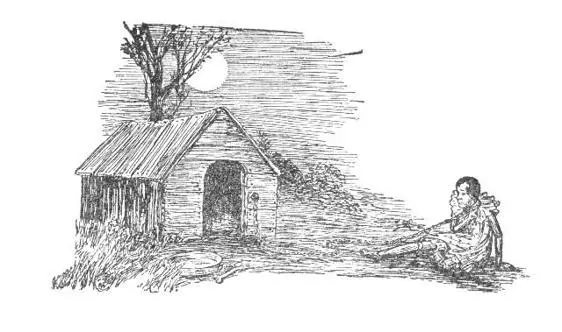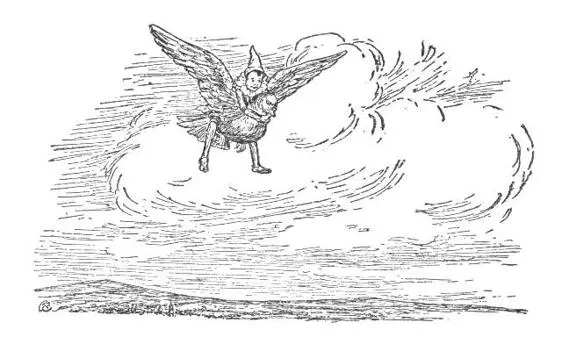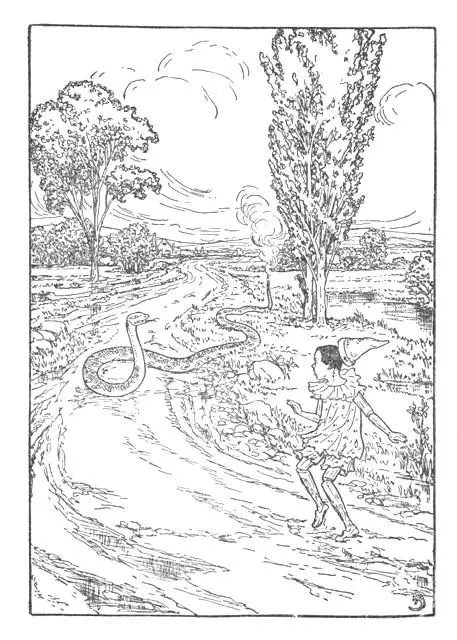Oh, if I could be born again! But now it is too late and I must have patience!"
Relieved by this little outburst, which came straight from his heart, he went into the dog–kennel and fell asleep.

CHAPTER XXII
PINOCCHIO DISCOVERS THE ROBBERS
He had been sleeping heavily for about two hours when, towards midnight, he was aroused by a whispering of strange voices that seemed to come from the courtyard. Putting the point of his nose out of the kennel, he saw four little beasts with dark fur, that looked like cats, standing consulting together. But they were not cats; they were polecats—carnivorous little animals, especially greedy for eggs and young chickens. One of the polecats, leaving his companions, came to the opening of the kennel and said in a low voice:
"Good evening, Melampo."
"My name is not Melampo," answered the puppet.
"Oh! then who are you?"
"I am Pinocchio."
"And what are you doing here?"
"I am acting as watch–dog."
"Then where is Melampo? Where is the old dog who lived in this kennel?"
"He died this morning."
"Is he dead? Poor beast! He was so good. But, judging you by your face, I should say that you were also a good dog."
"I beg your pardon, I am not a dog."
"Not a dog? Then what are you?"
"I am a puppet."
"And you are acting as watch–dog?"
"That is only too true—as a punishment."
"Well, then, I will offer you the same conditions that we made with the deceased Melampo, and I am sure you will be satisfied with them."
"What are these conditions?"
"One night in every week you are to permit us to visit this poultry–yard as we have hitherto done, and to carry off eight chickens. Of these chickens seven are to be eaten by us, and one we will give to you, on the express understanding, however, that you pretend to be asleep, and that it never enters your head to bark and to waken the peasant."
"Did Melampo act in this manner?" asked Pinocchio.
"Certainly, and we were always on the best terms with him. Sleep quietly, and rest assured that before we go we will leave by the kennel a beautiful chicken ready plucked for your breakfast tomorrow. Have we understood each other clearly?"
"Only too clearly!" answered Pinocchio, and he shook his head threateningly, as much as to say: "You shall hear of this shortly!"
The four polecats, thinking themselves safe, repaired to the poultry–yard, which was close to the kennel, and, having opened the wooden gate with their teeth and claws, they slipped in one by one. But they had only just passed through when they heard the gate shut behind them with great violence.
It was Pinocchio who had shut it, and for greater security he put a large stone against it to keep it closed.
He then began to bark, and he barked exactly like a watch–dog: "Bow–wow, bow–wow."
Hearing the barking, the peasant jumped out of bed and, taking his gun, he came to the window and asked:
"What is the matter?"
"There are robbers!" answered Pinocchio.
"Where are they?"
"In the poultry–yard."
"I will come down directly."
In fact, in less time than it takes to say "Amen!" the peasant came down. He rushed into the poultry–yard, caught the polecats, and, having put them into a sack, he said to them in a tone of great satisfaction:
"At last you have fallen into my hands! I might punish you, but I am not so cruel. I will content myself instead by carrying you in the morning to the innkeeper of the neighboring village, who will skin and cook you as hares with a sweet and sour sauce. It is an honor that you don't deserve, but generous people like me don't consider such trifles!"
He then approached Pinocchio and began to caress him, and amongst other things he asked him:
"How did you manage to discover the four thieves? To think that Melampo, my faithful Melampo, never found out anything!"
The puppet might then have told him the whole story; he might have informed him of the disgraceful conditions that had been made between the dog and the polecats; but he remembered that the dog was dead and he thought to himself:
"What is the good of accusing the dead? The dead are dead, and the best thing to be done is to leave them in peace!"
"When the thieves got into the yard, were you asleep or awake?" the peasant went on to ask him.
"I was asleep," answered Pinocchio, "but the polecats woke me with their chatter and one of them came to the kennel and said to me: "If you promise not to bark, and not to wake the master, we will make you a present of a fine chicken ready plucked!" To think that they should have had the audacity to make such a proposal to me! For, although I am a puppet, possessing perhaps nearly all the faults in the world, there is one that I certainly will never be guilty of, that of making terms with, and sharing the gains of, dishonest people!"
"Well said, my boy!" cried the peasant, slapping him on the shoulder. "Such sentiments do you honor; and as a proof of my gratitude I will at once set you at liberty, and you may return home."
And he removed the dog–collar.

CHAPTER XXIII
PINOCCHIO FLIES TO THE SEASHORE
As soon as Pinocchio was released from the heavy and humiliating weight of the dog–collar he started off across the fields and never stopped until he had reached the high road that led to the Fairy's house. He could see amongst the trees the top of the Big Oak to which he had been hung, but, although he looked in every direction, the little house belonging to the beautiful Child with the blue hair was nowhere visible.
Seized with a sad presentiment, he began to run with all the strength he had left and in a few minutes he reached the field where the little white house had once stood. But it was no longer there. Instead of the house he saw a marble stone, on which were engraved these sad words:
HERE LIES
THE CHILD WITH THE BLUE HAIR
WHO DIED FROM SORROW
BECAUSE SHE WAS ABANDONED BY HER
LITTLE BROTHER PINOCCHIO
I leave you to imagine the puppet's feelings when he had with difficulty spelled out this epitaph. He fell with his face on the ground and, covering the tombstone with a thousand kisses, burst into an agony of tears. He cried all night and when morning came he was still crying, although he had no tears left, and his sobs and lamentations were so acute and heart–breaking that they aroused the echoes in the surrounding hills.
And as he wept he said:
"Oh, little Fairy, why did you die? Why did I not die instead of you, I who am so wicked, whilst you were so good? And my papa? Where can he be? Oh, little Fairy, tell me where I can find him, for I want to remain with him always and never leave him again, never again! Oh, little Fairy, tell me that it is not true that you are dead! If you really love your little brother, come to life again. Does it not grieve you to see me alone and abandoned by everybody? If assassins come they will hang me again to the branch of a tree, and then I should die indeed. What do you imagine that I can do here alone in the world? Now that I have lost you and my papa, who will give me food? Where shall I go to sleep at night? Who will make me a new jacket? Oh, it would be better, a hundred times better, for me to die also! Yes, I want to die—oh! oh! oh!"

AN IMMENSE SERPENT STRETCHED ACROSS THE ROAD
And in his despair he tried to tear his hair, but his hair was made of wood so he could not even have the satisfaction of sticking his fingers into it.
Just then a large Pigeon flew over his head and, stopping with distended wings, called down to him from a great height:
"Tell me, child, what are you doing there?"
"Don't you see? I am crying!" said Pinocchio, raising his head towards the voice and rubbing his eyes with his jacket.
"Tell me," continued the Pigeon, "amongst your companions, do you happen to know a puppet who is called Pinocchio?"
"Pinocchio? Did you say Pinocchio?" repeated the puppet, jumping quickly to his feet. "I am Pinocchio!"
At this answer the Pigeon descended rapidly to the ground. He was larger than a turkey.
"Do you also know Geppetto?" he asked.
"Do I know him! He is my poor papa! Has he perhaps spoken to you of me? Will you take me to him? Is he still alive? Answer me, for pity's sake: is he still alive?"
"I left him three days ago on the seashore."
"What was he doing?"
"He was building a little boat for himself, to cross the ocean. For more than three months that poor man has been going all round the world looking for you. Not having succeeded in finding you, he has now taken it into his head to go to the distant countries of the New World in search of you."
"How far is it from here to the shore?" asked Pinocchio breathlessly.
"More than six hundred miles."
"Six hundred miles? Oh, beautiful Pigeon, what a fine thing it would be to have your wings!"
"If you wish to go, I will carry you there."
"How?"
"On my back. Do you weigh much?"
"I weigh next to nothing. I am as light as a feather."
And without waiting for more Pinocchio jumped at once on the Pigeon's back and, putting a leg on each side of him as men do on horseback, he exclaimed joyfully:
"Gallop, gallop, my little horse, for I am anxious to arrive quickly!"
The Pigeon took flight and in a few minutes had soared so high that they almost touched the clouds. Finding himself at such an immense height the puppet had the curiosity to turn and look down; but his head spun round and he became so frightened to save himself from the danger of falling he wound his arms tightly round the neck of his feathered steed.
They flew all day. Towards evening the Pigeon said:
"I am very thirsty!"
"And I am very hungry!" rejoined Pinocchio.
"Let us stop at that dovecote for a few minutes and then we will continue our journey, so that we may reach the seashore by dawn tomorrow."
They went into a deserted dovecote, where they found nothing but a basin full of water and a basket full of vetch.
The puppet had never in his life been able to eat vetch: according to him it made him sick. That evening, however, he ate to repletion, and when he had nearly emptied the basket he turned to the Pigeon and said to him:
"I never could have believed that vetch was so good!"
"Be assured, my boy," replied the Pigeon, "that when hunger is real, and there is nothing else to eat, even vetch becomes delicious. Hunger knows neither caprice nor greediness."
Having quickly finished their little meal they recommenced their journey and flew away.
1 comment